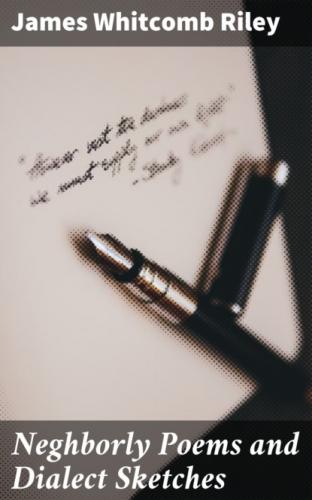And watchin' clos't, with upturned eyes,
The tree where Mr. Squirrel tries
To hide hisse'f above the limb,
But lets his own tale tell on him.
I wunder on in deeper glooms—
Git hungry, hearin' female cries
From old farm-houses, whare perfumes
Of harvest dinners seems to rise
And ta'nt a feller, hart and brane,
With memories he can't explane.
I wunder through the underbresh,
Whare pig-tracks, pintin' to'rds the crick,
Is picked and printed in the fresh
Black bottom-lands, like wimmern pick
Theyr pie-crusts with a fork, some way,
When bakin' fer camp-meetin' day.
I wunder on and on and on,
Tel my gray hair and beard is gone,
And ev'ry wrinkle on my brow
Is rubbed clean out and shaddered now
With curls as brown and fare and fine
As tenderls of the wild grape-vine
That ust to climb the highest tree
To keep the ripest ones fer me.
I wunder still, and here I am
Wadin' the ford below the dam—
The worter chucklin' round my knee
At hornet-welt and bramble-scratch,
And me a-slippin' 'crost to see
Ef Tyner's plums is ripe, and size
The old man's wortermelon-patch,
With juicy mouth and drouthy eyes.
Then, after sich a day of mirth
And happiness as worlds is wurth—
So tired that heaven seems nigh about—
The sweetest tiredness on earth
Is to git home and flatten out—
So tired you can't lay flat enugh,
And sorto' wish that you could spred
Out like molasses on the bed,
And jest drip off the aidges in
The dreams that never comes again.
A HYMB OF FAITH
O, Thou that doth all things devise
And fashon fer the best,
He'p us who sees with mortul eyes
To overlook the rest.
They's times, of course, we grope in doubt,
And in afflictions sore;
So knock the louder, Lord, without,
And we'll unlock the door.
Make us to feel, when times looks bad
And tears in pitty melts,
Thou wast the only he'p we had
When they was nothin' else.
Death comes alike to ev'ry man
That ever was borned on earth;
Then let us do the best we can
To live fer all life's wurth.
Ef storms and tempusts dred to see
Makes black the heavens ore,
They done the same in Galilee
Two thousand years before.
But after all, the golden sun
Poured out its floods on them
That watched and waited fer the One
Then borned in Bethlyham.
Also, the star of holy writ
Made noonday of the night,
Whilse other stars that looked at it
Was envious with delight.
The sages then in wurship bowed,
From ev'ry clime so fare;
O, sinner, think of that glad crowd
That congergated thare!
They was content to fall in ranks
With One that knowed the way
From good old Jurden's stormy banks
Clean up to Jedgmunt Day.
No matter, then, how all is mixed
In our near-sighted eyes,
All things is fer the best, and fixed
Out straight in Paradise.
Then take things as God sends 'em here,
And, ef we live er die,
Be more and more contenteder,
Without a-astin' why.
O, Thou that doth all things devise
And fashon fer the best,
He'p us who sees with mortul eyes
To overlook the rest.
WORTERMELON TIME
Old wortermelon time is a-comin' round again,
And they ain't no man a-livin' any tickleder'n me,
Fer the way I hanker after wortermelons is a sin—
Which is the why and wharefore, as you can plainly see.
Oh! it's in the sandy soil wortermelons does the best,
And it's thare they'll lay and waller in the sunshine and the dew
Tel they wear all the green streaks clean off of theyr breast;
And you bet I ain't a-findin' any fault with them; air you?
They ain't no better thing in the vegetable line;
And they don't need much 'tendin', as ev'ry farmer knows;
And when theyr ripe and ready fer to pluck from the vine,
I want to say to you theyr the best fruit that grows.
It's some likes the yeller-core, and some likes the red.
And it's some says "The Little Californy" is the best;
But the sweetest slice of all I ever wedged in my head,
Is the old "Edingburg Mounting-sprout," of the west.
You don't want no punkins nigh your wortermelon vines—
'Cause, some-way-another, they'll spile your melons, shore;—
I've seed 'em taste like punkins, from the core to the rines,
Which may be a fact you have heerd of before.
But your melons that's raised right and 'tended to with care,
You can walk around amongst 'em with a parent's pride and joy,
And thump 'em on the heads with as fatherly a air
As ef each one of them was your little girl er boy.
I
